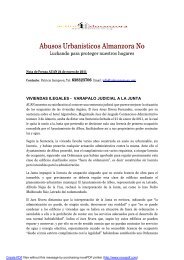European Property Rights and Wrongs - Diana Wallis MEP
European Property Rights and Wrongs - Diana Wallis MEP
European Property Rights and Wrongs - Diana Wallis MEP
Create successful ePaper yourself
Turn your PDF publications into a flip-book with our unique Google optimized e-Paper software.
curacy of the information offered. In Member States which follow the Germanic<br />
tradition, such as Austria, Pol<strong>and</strong>, Greece, there is a title registry (or a positive system).<br />
In this system the l<strong>and</strong> registry will only register the deed offered if the content<br />
proves to be accurate. This positive system is also adhered to in the United<br />
Kingdom (including Scotl<strong>and</strong>). The differences between the registration systems<br />
are substantial, especially as in positive systems there is a principle of public trust<br />
in the accuracy of the l<strong>and</strong> registry, which does not exist in negative systems.<br />
Moreover, registration in negative systems usually takes a day, whereas registration<br />
in a positive system can last up to 3 months.<br />
So if person A from Engl<strong>and</strong> seeks to acquire l<strong>and</strong> in another Member States,<br />
say France, person a will acquire a right of ownership providing him with the<br />
principal entitlement to l<strong>and</strong>, registration will be effected within a day. Moreover,<br />
because of the conveyancing system adhered to in French law, the ownership of<br />
the l<strong>and</strong> will transfer between parties at the moment of creation of the contract.<br />
In order for this to have effect against third parties, registration is necessary. This is<br />
not so much different from English law, where the conclusion of a contract for the<br />
sale of l<strong>and</strong> creates an interest under a trust for the buyer. However, if person A<br />
would have come from Germany, this effect would be completely unexpected. A<br />
from Germany would expect that besides a contract of sale, also further property<br />
law formalities are required before the property entitlement passes to him.<br />
It therefore matters what legal system applies to a transaction. When there is<br />
a cross-border transaction, <strong>and</strong> legal systems come into conflict with each other,<br />
the rules of private international law provide a connecting factor to prevent or<br />
solve such a conflict of law (an issue looked at in more detail in the next chapter).<br />
In l<strong>and</strong> law this is the rule of lex rei sitae or the law of the place where the object,<br />
ie l<strong>and</strong>, is situated. <strong>Property</strong> law transactions therefore are governed, as far as the<br />
property aspects of the transaction are concerned, by the legal system in which<br />
the l<strong>and</strong> is situated. As far as the contract of sale, or donation, is concerned, the<br />
Rome-I Regulation 20 applies <strong>and</strong> offers choice of law.<br />
20 Ed: The Rome I Regulation governing the law applicable to contractual obligations<br />
of a cross border nature. This should not be confused with the Brussels I regulation,<br />
on the recognition <strong>and</strong> enforcement of judgements across Member State borders<br />
referred to later on this publication<br />
37



